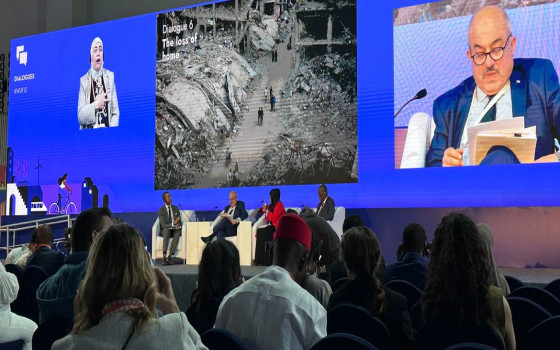
Supporting war-torn cities in the last hours of the events.. Today the World Urban Conference concludes in Cairo

- Europe and Arabs
- Friday , 8 November 2024 11:36 AM GMT
Cairo: Europe and the Arabs
Today, the activities of the World Urban Conference hosted by the Egyptian capital, Cairo, conclude. According to the United Nations daily news bulletin, on the eve of the closing, the participants in the forum discussed a complex issue related to urban development: What do we need to protect people and ensure their access to housing and basic services when war breaks out in a city crowded with people and vital infrastructure?
The atmosphere was prepared in the hall where the dialogue was held, as it was preceded by an early morning session that highlighted one of the urban crises: Gaza. The dialogue looked beyond the physical damage caused by crises, conflicts and climate events and focused on the loss of homes, which are places full of memories and community ties.
Ms. Annacludia Rosbach, Executive Director of the United Nations Human Settlements Program - which is holding the twelfth session of the forum in Cairo - told the participants: "When we talk about construction and reconstruction, we are not only talking about housing, but we are talking about social support and working with local communities to see a possible future."
Housing people next to their homes
Participants echoed this message throughout the discussion, emphasizing the crucial role of “joint efforts” for reconstruction and reconstruction. “Reconstruction can only be achieved through joint efforts and ensuring organized and systematic work so that we can benefit from past experiences and not repeat any mistakes that occurred during previous periods,” Mr. Sami Hijjawi, Minister of Local Government of the State of Palestine, told UN News.
He went on to stress that when addressing the issue of housing people and reconstruction, it is essential that people are housed next to their towns that will be reconstructed. Mr. Hijjawi said that development and urban expansion work is continuing “despite the difficult circumstances.”
“We are working, planning, programming and providing services to our people within the budgets available in these difficult times,” Mr. Hijjawi added.
A holistic approach in Somalia
Many ideas and experiences were shared regarding responding to the urban crisis, including in Somalia. Ms. Zahra Abdi Mohamed, Director of Poverty Reduction and Durable Solutions at the Somali Ministry of Planning, told UN News that there are some very good examples in Somalia.
“One of the projects is called the Indicative Project. It integrates housing, land and property issues with access to livelihoods and social services. We are trying to ensure that when support is provided to IDPs, it is comprehensive and integrated,” she added.
She called for a shift from a humanitarian to a development approach, stressing the importance of integrated development services for IDPs, refugees and returnees. She added that rural development was “essential” to encourage people to return.
The Destruction Crisis
Stopping the destruction in the first place is essential, according to Ms. Zhenya Gubkina, a Ukrainian architect who spoke at the dialogue on the loss of homeland. “We have a huge crisis, not only in rebuilding and building new types of architecture, but first and foremost, in destruction,” she told UN News.
She stressed that the discussion should include how to prevent aggressors from destroying homes. Ms. Gubkina warned that if that does not happen, “we build, and the aggressor will come and dismantle, and it is a difficult and frustrating situation for the whole world.” An urban phenomenon
There are 117.3 million displaced people worldwide, and cities are increasingly becoming the epicenter of global crises and places of refuge for displaced populations, creating an urgent need to rethink urban crisis responses. Sameh Wahba, the World Bank’s Regional Director for Sustainable Development in Europe and Central Asia, told UN News that displacement is an “urban phenomenon” because the majority of people displaced by natural hazards and conflict seek refuge in cities.
The solution to this issue, Wahba explained, is to provide integrated solutions “for refugees, internally displaced people, forcibly displaced people, and their host communities. The second thing is to think about people-based solutions, but also place-based solutions. So when you think about people-based solutions, whether it’s cash transfers or housing vouchers to enable them to get housing, it’s about helping them get jobs.”
Closing day
The World Urban Forum, held in Cairo, will conclude on Friday with the launch of the Cairo Call to Action, one of the three outcome documents of the 12th World Urban Forum that embodies the key messages that emerged from the forum.
On the final day, delegates will have the opportunity to participate in civil society and academic roundtables and other partner-led events. The closing ceremony will celebrate the outcomes and achievements of the 12th World Urban Forum.
The ceremony will include remarks from high-level officials, including representatives from UN-Habitat and the Government of the Arab Republic of Egypt, thought leaders, and creative presentations. It will highlight key moments and ideas that shaped the Forum.
The event will conclude with an official handover to Baku, Azerbaijan, the host country of the 13th World Urban Forum












No Comments Found